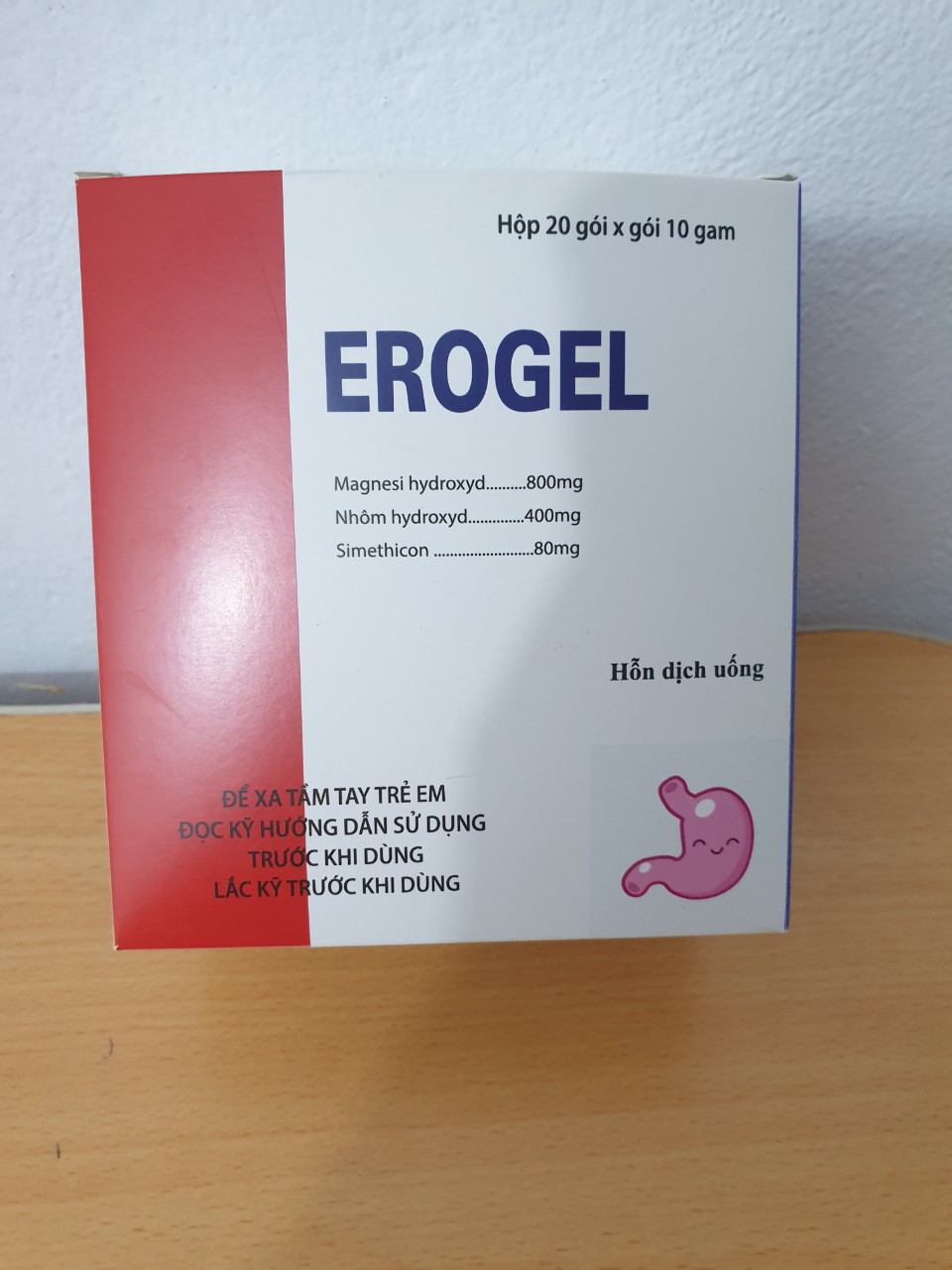1. Drug name
Erogel
2. Drug formula ingredients
Each 10g package contains Magnesium hydroxide 800mg; Aluminum hydroxide (as dry aluminum hydroxide gel) 400mg; Simethicone (as Simethicone emulsion 30%) 80mg
Excipients: qs.
3. Dosage form
Oral suspension.
4. Route of administration
Oral route.
5. Indications
The drug is used in the following cases:
- Acute - chronic gastritis, patients with gastroesophageal reflux, people with gastric antral inflammation.
- People with duodenal ulcers.
- People with flatulence, bloating, abdominal pain, and indigestion during the X-ray procedure.
- Patients poisoned by acids, corrosive substances causing bleeding, alkaline poisoning...
6. Administration, dosage
Dosage
Children: Take 1-2 packets/time x 2-4 times/day.
Adults: Take 1 packet/time x 2 - 4 times/day.
Administration
Medicines for oral use. Drink between meals, or 30 minutes - 2 hours after meals, at night before going to bed or when symptoms appear.
7. Contraindications
Patients who are allergic or sensitive to any ingredient of the drug.
Should not be used for children under 3 months old.
8. Special warnings and precautions for use
Are taking other drugs: See details in drug interactions section.
Children under 1 year old, use only when absolutely necessary.
9. Fertility, pregnancy and lactation
Can be used by pregnant women, but should avoid high, prolonged doses.
10. Effects on ability to drive and use machines
No effect of the drug on the ability to drive and operate machinery has been observed.
11. Drug interactions and incompatibilities
When taking the drug together with Quinidine, captopril, gabapentin, sucralfate, digoxin, iron-containing preparations, isoniazid, phenothiazine, tetracycline, fat-soluble vitamins (especially vitamin D)... will hinder absorption, leading to impaired absorption. reduce or lose the effectiveness of these drugs.
12. Undesirable effects
Aluminum hydroxide: May cause constipation. High doses and prolonged use of antacids containing aluminum will hinder the absorption of phosphate, easily leading to the risk of osteoporosis and osteoporosis.
Magnesium hydroxide: May cause diarrhea. People with impaired kidney function may experience hypermagnesemia when taking the drug.
13. Overdose
Symptoms: Causes diarrhea due to the effect of soluble magnesium salts on the intestinal tract.
Treatment: When overdose occurs, stop taking the drug and use appropriate treatment measures.
14. Pharmacodynamic properties
Pharmacological group: Antacids
ATC code: A02AB10
Aluminum hydroxide and magnesium hydroxide combined with simethicone will increase the protective layer of the gastric mucosa. Simethicone has a defoaming effect by reducing the surface tension of air bubbles, thereby preventing gas and indigestion.
Aluminum hydroxide and magnesium hydroxide increase the pH of gastric juice, which will inhibit the protid-lytic effect of pepsin - this effect is very important in people with gastric ulcers.
In addition, these two active ingredients are often combined together to reduce common side effects in the digestive tract (aluminum hydroxide causes constipation, magnesium hydroxide causes diarrhea).
15. Pharmacokinetic properties
Aluminum hydroxide dissolves slowly in the stomach and reacts with gastric hydrochloric acid to form aluminum chloride and water. About 17-30% of the formed aluminum chloride is absorbed and rapidly excreted by the kidneys in people with normal kidney function. Therefore, in people with kidney failure, there will be accumulation - usually in the bones and central nervous system - causing aluminum poisoning. In the small intestine, aluminum chloride is rapidly converted into insoluble, poorly absorbed alkaline salts that are excreted in the stool.
When ingested, aluminum hydroxide combines with phosphate to form insoluble aluminum phosphate in the intestines and is excreted through feces. If the diet is low in phosphate, aluminum-containing antacids will reduce phosphate absorption and cause hypophosphatemia and hypophosphatemia in the urine.
Magnesium hydroxide after ingestion reacts quickly with gastric hydrochloric acid to form magnesium chloride and water. It is usually excreted in the feces in the form of soluble and insoluble magnesium salts. Small amounts of the derivatives may be absorbed and excreted in the urine.
16. Packaging
Box of 20 packs x 10g with instructions for use.
17. Storage conditions, expiration date, and quality standards of the drug
Storage conditions: Cool and dry place, protected from light, temperature not exceeding 30 o C.
Expiry date: 36 monthsfrom the date of manufacture.
Quality standards of drugs: in house
18. Name and address of the drug manufacturing facility
Euro Santé Pharmaceutical Joint Stock Company
Song Cung industrial site, Dong Thap commune, Dan Phuong district, Hanoi city, Vietnam.








